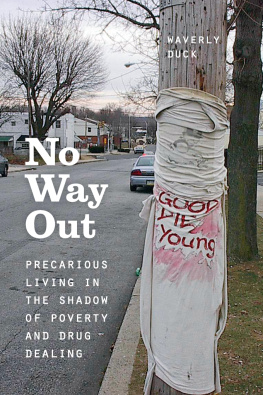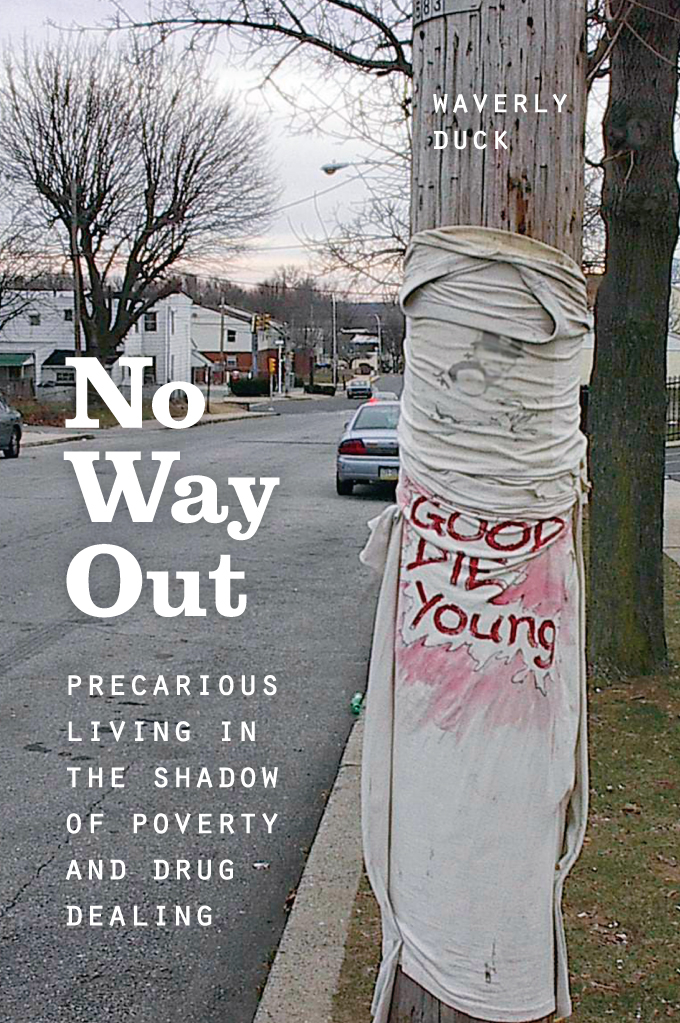All rights reserved. Published 2015.
Duck, Waverly, author.
No way out : precarious living in the shadow of poverty and drug dealing / Waverly Duck.
Includes bibliographical references and index.
ISBN 978-0-226-29790-3 (cloth: alkaline paper) ISBN 978-0-226-29806-1 (paperback: alkaline paper) ISBN 978-0-226-29823-8 (e-book) 1. Drug trafficSocial aspectsNortheastern States. 2. Urban poorNortheastern StatesSocial conditions. 3. Cities and townsNortheastern States. 4. Sociology, UrbanNortheastern States. I. Title.
This paper meets the requirements of ANSI/NISO Z39.48-1992 (Permanence of Paper).
This book began when I was asked to collect ethnographic data about an impoverished black neighborhood to buttress an argument for mitigating circumstances in a federal death-penalty case. Although I grew up in a similar neighborhood, I was disturbed by what I saw transpiring in this community. Major social changes seemed to result from shifts in public policy, particularly welfare and housing reform, the war on drugs, and the rising costs of food, housing, and energy. I was puzzled about the interconnections among these factors and the communitys embedded drug trade. At the same time, I was moved by the love, support, and solidarity that existed within the neighborhood. I am grateful to the countless residents, attorneys, journalists, activists, friends, and families who opened their homes and told me their stories, all of whom must remain anonymous.
In this community, the constraints are multiple, overlapping, and to an unfortunate extent mutually reinforcing: the absence of decent jobs and schools, the radical contraction of the social safety net, a criminal justice system that makes everything more insecure, and child-support laws that backfire on people with limited resources and job prospects. The few available economic opportunities carry real dangers. With no legal jobs nearby, you need to drive to work; but if you have been unable to pay traffic fines or car insurance, even minor traffic infractions can get you jailed. If you have no resources, managing child care and earning the income to support your family seriously impede each other. The multiple risks of the drug trade affect the whole community, not just users and sellers.
No Way Out: Precarious Living in the Shadow of Poverty and Drug Dealing is an homage to classic ethnographic and qualitative studies, especially W. E. B. Du Boiss The Philadelphia Negro, Joyce Ladners Tomorrows Tomorrow, Carol Stacks All Our Kin, Ruth Horowitzs Honor and the American Dream, Elliot Liebows Tallys Corner, Elijah Andersons A Place on the Corner, Herbert Ganss Urban Villagers, Jay MacLeods Aint No Makin It, Gerald Suttless The Social Order of the Slum, and Mary Pattillos Black on the Block. It draws on the theoretical legacy of Emile Durkheim, Harold Garfinkel, Erving Goffman, and Anne Warfield Rawls.
A word about the title. The term precarity recently came into common usage in Europe, especially in the anti-globalization movement, to refer to the flexible, contingent, and casually employed labor forcewhich includes both low-wage workers in service positions and knowledge workers such as customer service representatives in technology companies call centers. The best description of this global trend is Michael Hardt and Antonio Negris Multitude: War and Democracy in the Age of Empire (2004). My usage, in contrast, focuses on the lives of my participants, rather than their labor: these people are, at best, employed only intermittently, and their entire existence, not just their income, is insecure. They are part of what used to be called the underclass, rather than people whose well-founded expectations of financial security have been disappointed by neoliberal shifts in the labor market. The Catholic radical Dorothy Day once used precarious in the sense as I do hereto refer to the predicament of people living in chronic poverty.
No Way Out has been more than ten years in the making. No intellectual endeavor is possible without the support of friends, family, colleagues, and academic institutions. I would like to acknowledge Craig Alston, Nadine Amalfi, Elijah Anderson, Alan Artenstein, Dana Asbury, Ralph Bangs, Joyce Bell, Kathleen Blee, Scott Brooks, Rodd Brunson, Lisa Brush, Randall Collins, Megan Comfort, Andrea Cossu, Larry E. Davis, Ervin Dyer, Mustafa Emirbeyer, Mike Epitropolous, Anette Fasang, David Fasenfest, Myra Marx Ferree, Judith Gay, Robert Gay, Raymond Gunn, Keith Hagans, Jennifer Hamer, Juho Hrknen, Ruth Horowitz, Nikki Jones, Nancy Kasper, Ella Kemp, Esther Kim, Laurie Krivo, Charles Lemert, Peter Lichtenberg, Victor Lidz, Dwayne Lucky, Wynn Maloney, Peter Manning, John Markoff, Douglas Maynard, Reuben Miller, Dru Moorhouse, Peter Moskos, Joyce Oliver, Grey Osterud, Edward Park, Barry Pearlman, Anthony Peguero, Ruth Peterson, Anne Warfield Rawls, Barbara Ray, Victor Rios, Stevie Roberts, Suzanne Staggenborg, Lizzie Stoyle, Steven Swanson, Jason Turowitz, Randall Walsh, Loic Waquant, and Aaron Weller. To my mother, Georgia Duck, and my oldest brother, Maurice Duck, thank you for contributing to a moral compass situated in love and justice.
I am grateful to have received support from the University of Pittsburghs Center on Race and Social Problems; Yale University, where I was a postdoctoral fellow while I conducted much of the fieldwork; and the students who changed my life at the Community College of Philadelphia, the Cheshire Twenty at the Cheshire Institutional Facility, and the University of Pittsburgh.
Finally, I owe special thanks to Doug Mitchell, who believed in this project from the beginning. His support has been unwavering and his friendship, invaluable.
What Ludwig Wittgenstein wrote in the introduction to his Philosophical Investigations captures my sentiments: I should not like my writing to spare other people the trouble of thinking. But, if possible, to stimulate someone to thoughts of their own. I should like to produce a good book. This has not come about, but the time is past in which I could improve it.
Precarious Living
Although the United States has elected an African American president and the civil rights bill was passed more than fifty years ago, poor persons of color in many of our cities find themselves increasingly poor and racially isolated. On a street notorious for its thriving drug trade in an economically depressed and predominantly black city, I asked long-term residents how they felt about their neighborhood and why they stayed. Mrs. Wells, a seventy-eight-year-old African American, replied: You know what, in a way it sounds crazy, but I feel protected. A lot [of] people who have moved out of the neighborhood have gotten broken in on, robbed. Here, I feel protected. As bad as it seems out there with the drugs and things, I feel protected. Because the guys out there with the drugs and things were out there doing their thing. They werent going to break in on you and they werent going to let no one else break in on you. Here I feel protected. That paradoxical response was typical rather than exceptional. In this community, the drug dealers are not outsiders but long-term residents who are well integrated into community life and protect it as their own.







